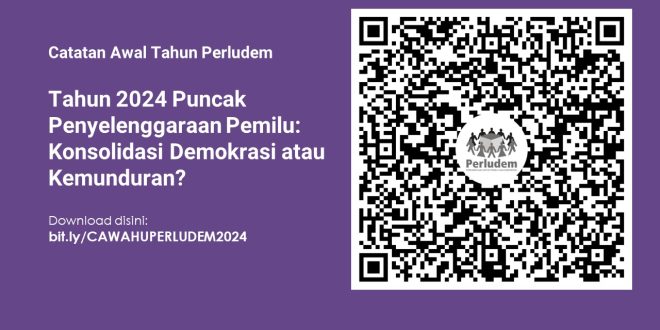Perkumpulan untuk Pemilu dan Demokrasi [The Association for Elections and Democracy] (Perludem) has launched its Catatan Awal Tahun [Year-Opening Notes] (Cawahu) to document and reflect on all events related to electoral and democracy issues throughout the year 2023. The agenda for electoral reform needs to be promoted for the improvement of the electoral system and the entire electoral framework. Perludem emphasizes the importance of every electoral actor being an initiator for an integrity-filled election, as the 2024 Elections will determine the direction of Indonesia’s democratic consolidation.
“It’s noteworthy that the advocacy we conducted in 2023 was done through legal activism, as a series of actions we took reached an impasse, leading us to conduct a material test at the Constitutional Court (MK),” said Perludem’s Executive Director, Khoirunnisa Nur Agustyati, during the launch of Cawahu titled “Tahun 2024 Puncak Penyelenggaraan Pemilu: Konsolidasi Demokrasi atau Kemunduran? ”[2024, the Peak of Electoral Implementation: Democratic Consolidation or Regression?]” in Tebet, South Jakarta, on January 14th.
Khoirunnisa stated that the legal activism steps taken actually bore fruit, but some sanctions and follow-up actions by the election organizers were not satisfactory and tended to disregard legal decisions. According to her, given the complexity of elections in Indonesia, election organizers should work with full readiness, rather than using it as an excuse to relax election rules.
“Whatever happens in 2024 is an accumulation of events from the previous year, 2023,” she explained.
Perludem Program Manager, Fadli Ramadhanil, explained that the chaos in the electoral system during the electoral process is a consequence of the cancellation of the revision of the Election Law in 2020. According to him, at that time, all political parties felt that the legal framework for elections needed to be improved because there were still many things that needed to be evaluated and strengthened after the 2019 Elections. However, in the middle of the process, President Joko Widodo suddenly stopped the plan to revise the Election Law.
“Finally, during the electoral process, there were many things that the House of Representatives (DPR) and political parties wanted to correct, which ultimately ended up at the Constitutional Court (MK). This should not happen again,” said Fadli.
According to him, after the completion of the 2024 Elections, the agenda for electoral reform must be a priority for the elected president to prevent any forced changes in the midst of elections. Therefore, the arrangement of the electoral system and the electoral legal framework must be thoroughly discussed by no later than the end of 2025. []
Translated by Catherine Natalia
 Rumah Pemilu Indonesia Election Portal
Rumah Pemilu Indonesia Election Portal




